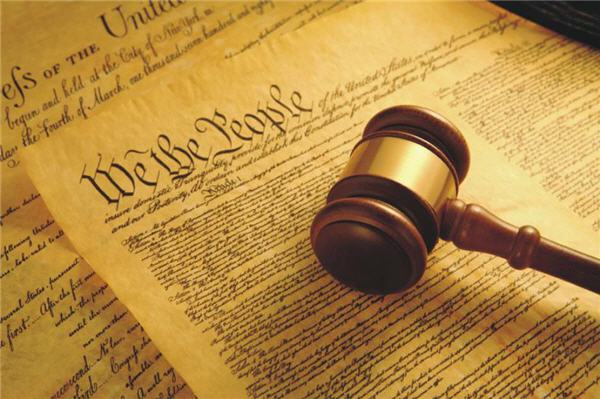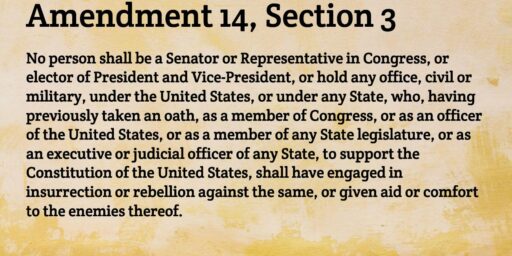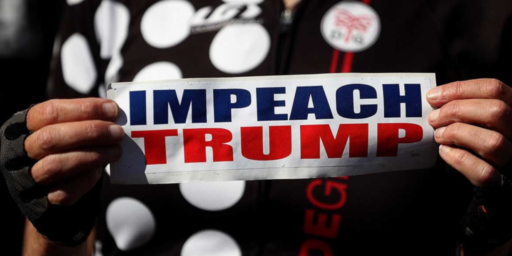On Constitutionality and Impeaching a Former President
The problem is theoretical at best and cannot stop the Senate from acting.

It is difficult to know what Trump’s defense will be when his impeachment trial starts in the second week of February if anything because he is having trouble retaining a legal team. Perhaps the strongest, and the one that a lot of Republican Senators will use as an excuse to vote to acquit, is that it is not constitutional to impeach a former president.
The argument is pretty straightforward, and it is not without logical merit. The US Constitution say the following about the Senate trial (Article I, Section 3):
Judgment in Cases of Impeachment shall not extend further than to removal from Office, and disqualification to hold and enjoy any Office of honor, Trust or Profit under the United States: but the Party convicted shall nevertheless be liable and subject to Indictment, Trial, Judgment and Punishment, according to Law.
Put simply, since the sequence is conviction, removal, and then a vote on disqualification, how can you remove someone not in office?
There is a certain elegance in this notion, I will admit.
Now, my view is that since there are two sanctions listed (remove and disqualification) then it has to be possible to proceed through the process even if the removal portion is moot. Indeed, many people who have been impeached have been removed but not disqualified from holding office, so why not the other way around?
To be honest, it is unclear to me that the constitution forbids simply disqualifying Trump and not worrying about the removal part. All the document says is that punishment cannot go beyond these two items.
I think that those who focus on the sequencing issue are being too literal as well as ignoring the spirit of the clause. Since both punishments are linked to holding office (and only holding office) it stands to reason that the Senate would have the power to forestall future office-holding of someone who committed impeachable acts at the end of their term.
So, if an office-holder oh, I don’t know, incited insurrection two weeks before leaving office, is it really that big a stretch to think that barring such a person from holding future office might not be a good idea?
What better reason to bar an official from holding future office than that official inciting an attack on the US Capitol in the hopes of disrupting the election of his successor?
The notion that time could run out on a term and, therefore, the constitutional sanction of disqualification is taken off the table strikes me as problematic. Are we really going to say that if a president takes a bribe on their last day in office that is okay because the clock ran out? Do we want such a person running for the House or Senate in two years? Do we want them eligible to be named to the bench?
What I am about to say will probably annoy attorneys and law profs, but I think that constitutionality is largely a political process and that there are two broad categories, and one important sub-category, that cuts through discussions of various frames of interpretation.
The first category is the easy one. There are some portions of the Constitution that are not amenable to argument or interpretation. For example, Article I, Section 2:
No Person shall be a Representative who shall not have attained to the Age of twenty five Years, and been seven Years a Citizen of the United States, and who shall not, when elected, be an Inhabitant of that State in which he shall be chosen.
It is impossible to argue that an eighteen-year-old can take a seat as a US Representative. There are no fancy means of interpreting the document nor any political pretzel logic to get you to any other conclusion than a US Representative has to be at least twenty-five years of age on the day they are sworn into office.
However, the document is full of statements that are not so clear. Indeed, even statements that appear unequivocal aren’t as concrete as they seem. Take, for example, the free speech clause of the First Amendment:
Congress shall make no law… abridging the freedom of speech
I mean, pretty clear, right? No law means no law! Except, of course, there are laws against slander, regulations on commercial speech, federal regulations on certain language used on broadcast outlets, and against incitement.
So it ends up, the plain letter on the page is not as great a guidance as we like to pretend it is. In the case of regulations on speech, they exist due to a combination of long-standing practices (such as prohibiting slander) and political compromises that emerge due to changing societal conditions (e.g., FCC regulations over what can be broadcast).
The speech example is to illustrate that even seemingly unambiguous language may not actually be so.
The only time something is definitively constitutional or not is either when the black letter of the document is utterly unambiguous or when Congress and the Courts have decided otherwise. That’s a pretty big “or.”
And, of course, there is the ever-evolving set of legal precedence and interpretations within our common law traditions that our attorney friends are needed to unscramble.
In general, the question of what the constitution means is far more about politics than it is about decoding the “real meaning” of the document.
So two categories: 1) black letter obvious or 2) politically derived via legislation and judicial action.
A sub-category of #2 strikes me as where the question of “can you convict an ex-president in a Senate impeachment trial” resides–which is direct action by Congress. This is profoundly political and not amenable to judicial action, at least not at this stage (I suppose that if Trump were denied the right to hold office he could take the matter to court and claim the action was unconstitutional, but that can only happen if the Senate first acts).
Fundamentally it seems to me that it boils down to this: there is nothing that can stop the Senate from holding the trial (save the Senate itself). While many GOP members will claim that that they are voting to acquit based on a constitutionality argument (whether they believe that position of not is immaterial) the reality is that unless the Senate convicts and that conviction is this challenged in court and then overturned by the Supreme Court, the claim that is it an unconstitutional process is just that, a claim.
And it is a claim that cannot stop the Senate from acting (clearly). Although, it can be used as a political means for Senators to vote to acquit.






I’ll venture to embellish. The Supremes have weighted in on this issue.
According to the Supreme court, the scope of the power to impeach is all but as broad as the Senate determines it to be.
Except that’s not what it says. The part you quoted makes no assertions about sequence, either explicit or implied. It (as you go on to note) asserts a conjunction:
“And” does not necessarily mean “and then”. You can prosecute a burglar for “breaking and entering” even if the door wasn’t locked. You don’t even need to invoke the two different sanctions provided to get that far.
@DrDaveT: Indeed, which is why I said:
The sequencing is really an artifact of history and the fact that impeachments have been of office-holders.
I understand that your intent here is to write about the legal and political questions regarding Trump’s impeachment trial, Dr. Taylor, so this isn’t about your OP as much as it is about the public discourse in this moment. But I find it fascinating that a debate about how to deal with Trump’s incitement of insurrection can be had without using any words like justice, moral, fair, precedent, or wrong.
The Republicans have won the debate because we are talking about whether the Senate should or can hold a Senate trial on Trump’s impeachment or whether GOP Senators will or won’t vote to acquit him. We are not talking about whether it is just for a President to be above the law, or whether it is immoral for a politician to incite a mob against other politicians, or whether it is dangerous to set a precedent that criminal acts (like sedition) can be taken without consequences.
I’ve and idea: let’s agree to bypass the Constitution and institute and amendment via plebiscite, as determined by Electoral College votes. The amendment would read: Republican presidents are held to be above the law in perpetuity, and are never to undergo any adverse consequences for their actions.
after it passes, Trump would be restored to his old job (as losing it was an adverse consequence), and his approval rating would be permanently set at 105%.
You are assuming that the only way to attain the age of 25 is the old fashioned way — by being born 25 years ago (or, perhaps, time-travel shenanigans such that the person has lived for 25 years).
I would ask what entities confer an age upon someone, and whether they are required to confer the person’s biological age. Could the state, say whatever state Doogie Houser was in, declare that the 14 year old wonder kid surgeon is, legally, 25 — capable of serving as a Representative, drinking and renting a car without the under 25 penalty?
It’s absurd, but I think that ultimately gets decided by the House, which has the right to not seat members. IIRC, all of the various birther lawsuits claiming Obama was a secret Kenyan were thrown out for lack of standing.
I would also note that this clause only seems to apply to a Person, and that when we have a robot representative, or a house cat (or should I say House cat?) it would not apply.
In short, the constitution only means what the courts agree it means. And traditionally, the courts have bent over backwards to not have to decide that type of political issue. On the subject of impeachment, there have been lower office impeachment’s where the House and Senate set up all sorts of rules to streamline the process — evidence heard only by a committee, for instance — and the courts have upheld that.
Realistically, though, since we inherit English common law, we should look at impeachments there as part of our tradition, and there it was allowed.
Further, I think the key point of this clause is “shall not extend further than”:
The clause is limiting the punishment, it has nothing to do with the timing, or even whether the Senate can hold a trial with no prospect of punishment at all. There may be something else that prohibits trying even a dead President, but this isn’t it.
@dazedandconfused: I believe that your conclusion is correct but not on the basis of a commentary published in 1833 by a former associate justice of the Supreme Court. It’s Sunday and I am not going to do legal research but I don’t believe the US Supreme Court has issued an opinion on this issue. The impeachment process can and has been used to attempt to punish a wrongdoer for actions taken during his or her performance in office. I suggest use of the Senate’s own precedent regarding William Belknap, Secretary of War in the Grant administration who was tried AFTER he resigned his office.
Incitatus.
I’m not a Constitutional scholar or even a lawyer, but I am a civics and Constitution nerd.
In my view, a fair reading of the Constitution is that a trial can take place after Trump leaves office as long as he was impeached while still in office – which is the case. The only thing that changes is that removal from office is – obviously – no longer an available punishment.
By the same token, I think Roberts should still preside over the trial. If the fact that Trump is no longer in office means that the Chief Justice no longer has to preside at the trial, then I’d question the entire trial itself. In other words, there should be some consistency in how a trial is handled: Trump was impeached while in office, therefore all aspects of the trial should flow from that.
@dmichael:
I had thought I was reading an opinion. Thanks for straightening that out. It’s only useful, if at all, by being roughly contemporaneous to the founding should anyone go “original intent” on this. Unlikely they will delve that deep. Trump is said to be rejecting a process argument, he want’s to use the trial to continue to assert the election was stolen. Probably the best tack for him to take. BSers shouldn’t play defensively.
I wonder if the 5th still holds sway in this process. That is, can they call Trump as a witness?
The constitutionality of impeaching a former president is mostly just a red herring.
It’s an excuse to avoid debating the real issue: whether it is OK to use a mob to overturn a free and fair election.
Because I can guarantee that the number of GOP Senators who have explicitly and forcefully condemned Trump’s actions but will vote to acquit because of some constitutionality argument will be pretty much zero.
Absolutely noone will be seriously arguing that relevant authorities should take a long and hard look into whether Trump could be held criminally or civilly liable for siccing a murderous mob on Congress, but that impeachment is now, unfortunately, off the table.
This tells you that the constitutionality debate (which, in theory, perhaps could be a genuine debate) is – in this particular context – not an actual debate.
In this context, it’s a mechanism for avoiding taking responsibility. It’s a trap, and neither voters nor reporters should fall for it.
Everyone who is taking about whether the Chief Justice should preside or not, or some other bit of arcane nonsense, is someone who is chasing one of the nice, shiny baubles that professional bullshitters have been diligently spreading around. Congratulations, you’re an easily distracted sucker.
@Andy:
Agree wholeheartedly.
The Constitution gives impeachment power to the House. That part was done while Ex-Pres Trump was in office. (At least that what we all remember. Christ only knows if that is what Trump’s lawyers will say once a case starts and the gaslighting begins.)
The Constitution then states that “senate shall” hold hearing. Not that then might, or that they may not if they don’t feel like it.
ARTICLE I, SECTION 3, CLAUSE 6
So, no timeline. But they SHALL do it. Could be tomorrow, could be 20 years later, if they wish. (and THAT could be a loophole of which they had not considered… but death could make that moot by then).
As to the Chief Justice presiding:
(source)
What does suck is that “shall” is a debatable term. Having recently watched “What the Constitution Means to Me” (highly recommended btw), the Supreme Court really put women’s rights at question by debating the meaning of the word “shall”. And it is not the only time that has come up.
https://facultyblogs.law.ufl.edu/state-supreme-court-case-fuels-debate-over-shall-and-a-possible-solution-to-the-shall-problem/
So. The Senate Shall. But that may not mean “must” or even “will”. And that sucks, because those of us that walk the earth and not the halls of the Supreme Court know that if I tell my wife that I shall get to that, I’d better. Sooner more than later.
And in this SPECIFIC case, we know that the Senate will, becaose teh Dems will force it. But sadly most of the Senate will not take it seriously. Because Jewish space lasers and authoritarian fealty. Not guilty.
fuckers.
Trump has acquired two new lawyers for his defense team: David Schoen and Bruce L. Castor, Jr. No word on whether they’ll be willing to go along with his election fraud “defense.”
What’s the over/under on how long this duo lasts?
P.S. Schoen met with Jeffrey Epstein about representing Epstein shorty before Epstein offed himself.
@dazedandconfused: They can call him as a witness but they won’t. Ted Lieu is a scary smart lawyer and one of the impeachment managers and it would very much surprise me if videos of Trump’s various public remarks aren’t shown at the trial.
@Liberal Capitalist:
I would read that as the Senate has the sole power — no one else can try impeachments — not that they are required to.
It does not say that “the Senate shall try all impeachments.”
@CSK: Trump’s new lawyer was the lawyer Epstein got right before he killed himself? Ok, if Trump kills himself, I think we’re going to have to look into that lawyer.
@Gustopher:
Schoen, the new lawyer, seems not to believe that Epstein killed himself.
@Gustopher: or, you know, just ignore it.
@Gustopher:
That is my point, in a way: the “shall” factor causes problems, because the founder use of shall is not the same as ours.
If we look at it historical, when someone in 1760 said: “I shall and I shan’t tarry” it mean that it will be done. Saying that one shall then… well, it was pretty well a guarantee.
However today, if we say that “The fire department shall respond to fires”, we would not be talking about a specific fire, nor does it guarantee that the fire department will respond to every fire. Our use of shall has much more wiggle.
In short, “shall” sucks.
Still… for them to try to make a case of the fact that the trial is itself unconstitutional on these grounds, well, fat chance.
If the 45 Republican senators who voted to declare the proceedings unconstitutional intend to be consistent, they will not participate in the trial. Sitting as a jury in a trial which you believe to be unlawful would not only be nonsensical but lend an air of legitimacy to a process you just declared ought not to be taking place at all.
So it seems to me Trump Republican senators should not attend the trial and not vote on a verdict, if they wish to abide by their espoused principles. It’s true this would result in Trump’s conviction, but on their logic, the conviction is a “conviction” that lacks any lawful standing. Trump would be free to ignore it, and should anyone purport to disqualify him from running again in ’24, they will be told by the courts that the Senate’s order is null and void for lack of constitutional authority.
In short, these 45 senators can take trial week off to work on their short irons or however they spend their leisure time, confident that anything the Senate claims it will do to Mr Trump will be an exercise in futility.
We’re in agreement pretty much across the board but I would at least quibble with the conclusion
While I agree with the ultimate conclusion—the Constitution isn’t self-enforcing and is ultimately about what a majority of the Supreme Court will allow, if the dispute even gets that far—I do think Senators and others who have taken an oath to the Constitution are obliged to do their best to follow it. So, if a Senator honestly believes the Constitution prohibits their trying an official who has left office, they ought to refuse to participate in the process.
@James Joyner:
Come on, James. These are Republicans. They’re not going to act on anything remotely resembling honest belief. I’d wager 90% honestly believe Trump is responsible for the events of January 6, but they don’t want to piss off his rabid base so they will use this constitutionality question as an easy out.
@James Joyner:
I take the point. Indeed, if they really believed this was a truly unconstitutional act, then they ought to be making a lot more noise and be actually trying to stop the process instead of just making symbolic moves and then using “unconstitutional” as a rhetorical device.
I think this gets to the fact that in our politics we throw around the word “unconstitutional” a bit too easily.
@Mikey: I don’t know what the numbers are but agree with the sentiment.
@Steven L. Taylor: Agreed.
@Steven L. Taylor:
Area Man Passionate Defender Of What He Imagines Constitution To Be
@Liberal Capitalist:
“The fire department shall have the sole power to put out all fires” — that just limits everyone else from putting out fires. The problem isn’t that “shall” but that “have the sole power to”